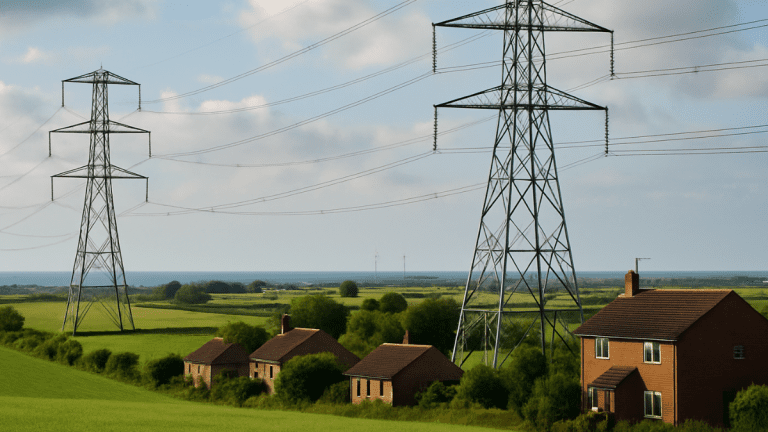
🕒 Last updated on August 8, 2025
Government Offers Energy Bill Discount to Pylon Neighbours
The UK government is proceeding with its proposal to reduce energy costs for thousands of households if they reside close to new power infrastructure, such as pylons.
The scheme will offer up to £2,500 in total over ten years to people living within half a kilometre of new or upgraded electricity lines, pylons, or substations. That works out to around £250 off each year, split into two payments of £125 every six months. Payments could start as soon as next year.
The government says this move will help speed up the construction of power grid upgrades, which are needed to meet its clean energy targets. The UK intends to construct twice as much new grid infrastructure over the next five years as it has over the previous ten.
This includes overhead power lines and pylons along parts of the east coast of England, designed to carry electricity from offshore wind farms in the North Sea to homes and businesses across the country. Officials say the new lines are essential for expanding wind and solar power and for meeting the goal of creating a zero-carbon electricity system by 2030.
Local Resistance and Political Pressure
While the payouts are intended to win over local support, many communities in areas marked for new infrastructure are not happy. Some residents worry that the tall pylons and power lines will spoil views, reduce property values, and disturb the local environment.
The plan has drawn particular anger in parts of eastern England, where major new lines are set to run through rural landscapes. These areas are expected to play a key role in connecting renewable energy projects to the national grid.
The ESG Advantage: Why CleanTech Startups Are Quietly Winning the Green Gold Rush
Opposition groups have already promised to fight against some of the projects. Political figures in certain regions have pledged to use all available powers to block construction, especially in counties where public meetings have shown strong resistance.
Despite the criticism, the government insists that the payments will place communities “at the heart” of the UK’s push for cleaner and more affordable energy. Officials say they want to ensure that those who host the new infrastructure benefit directly from it.
New Rules for Smart Meters to Protect Households
Alongside the pylon payment plan, the government has announced new rules to address problems with smart meters. These devices, which send meter readings directly to suppliers, have been part of a £20 billion rollout aimed at improving billing accuracy and energy management.
However, the programme has faced major delays. Many homes still do not have smart meters, and there have been widespread complaints about faulty devices, long installation times, and poor aftercare.
Under the new regulations, energy companies will face tougher obligations to make sure smart meters are installed correctly and repaired quickly when they fail. Households will also receive better compensation if they have to wait too long for installation or repairs.
⚡Clean energy crisis — EPA pulls plug on $7 billion “Solar for All” grants
Currently, about three-quarters of UK homes have a smart meter, even though the original plan was for all homes to have one by 2019. The deadline has been extended multiple times and is now set for the end of 2025.
Industry regulators say the changes will make getting a smart meter faster and easier while ensuring suppliers meet clear service standards. The aim is to restore public confidence in the rollout and make sure faulty meters are fixed promptly.
The government believes the combined steps—pylon discounts and smart meter protections—will help overcome some of the barriers slowing down the UK’s clean energy transition. Both measures are expected to be in effect from next year, subject to final approvals.